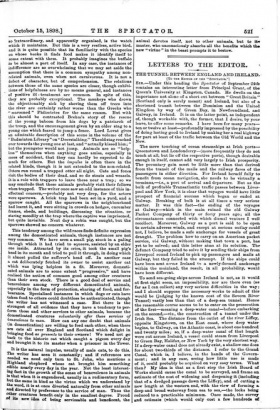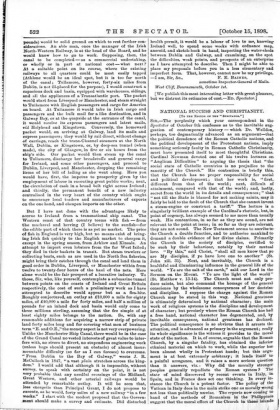LETTERS TO THE EDITOR.
THE TUNNEL BETWEEN ENGLAND AND IRELAND..
[To IRS EDITOS OP THE " SPICTLTOILl SIR,—Under this heading the Spectator of September 24th contains an interesting letter from Principal Grant, of the Queen's University at Kingston, Canada. He dwells on the importance not alone of a short cut between "Great Britain" (Scotland only is surely meant) and Ireland, but also of a shortened transit between the Dominion and the United Kingdom by way of Green Bay, in Newfoundland, and Galway, in Ireland. It is on the latter point, as independent of, though workable with, the former, that I desire, by your leave, to offer some remarks. I have been for many years— ten or twelve at least—profoundly impressed by the possibility of doing lasting good to Ireland by making her a real highway for part at least of the traffic between the Old World and the New.
The mere touching of ocean steamships at Irish ports— Queenstown and Londonderry—(more frequently they do not touch at all, but lie off the respective ports), though desirable enough in itself, cannot add very largely to Irish prosperity. The pecuniary gain must be little more than that derived from the transit of the mails and the railway fares of the passengers in either direction. For Ireland herself fully to benefit from ocean navigation, she needs to be virtually a, terminus,—i.e., a port of arrival and departure. But as the bulk of profitable Transatlantic traffic passes between Liver- pool and New York, it is clear that voyages would have little prospect of financial success which began or ended at Galway. Breaking of bulk is at all times a very serious matter. It was this fact—the ending of the voyages at Galway—which in the main rained the old Galway Packet Company of thirty or forty years ago ; all the circumstances connected with which dismal venture I well recollect. Moreover, Galway as a port is said to be open to certain adverse winds, and except at serious outlay could not, I believe, be made a safe anchorage for vessels of great draught. The problem how to carry on an American packet service, via Galway, without making that town a port, has yet to be solved; and this letter aims at its solution. The defunct Company tried to solve it by sending their ships from Liverpool round Ireland to pick up passengers and mails at Galway, but they failed in the attempt. If the ships could have been sent across Ireland to a newly-formed anchorage within the mainland, the result, in all probability, would have been different.
To send sea-going ships across Ireland is not, as it would at first sight seem, an impossibility, nor are there even (as far as I can collect) any very serious difficulties in the way; and I should suppose the necessary works to admit of this would be (judging by the known cost of the Severn River Tunnel) vastly less than that of a. deep-sea tunnel. Hence the reasonable course seems to be to enter on the prosecution of the first—meaning a deep-water canal—before embarking on the second,—viz., the construction of a tunnel under the Irish Sea. The distance from the outlet of the river Liffey, opposite Kingstown, on the East coast, where deep water begins, to Galway, on the Atlantic coast, is about one hundred and twenty miles ; so, if a deep-water canal of that length were cut across Ireland, a vessel could steam from Liverpool to Green Bay, Halifax, or New York by the very shortest way. If a deep-water canal does not already exist, a shallow one does for about two-thirds of the distance. I refer to the Grand Canal, which is, I believe, in the hands of the Govern- ment; and in any case, seeing how little use is made of it, could probably be acquired on very easy terms. What then P My idea is that as a first step the Irish Board of Works should cause the canal to be surveyed, and frame an estimate of the cost of widening and deepening it (including that of a dredged passage down the Liffey), and of cutting a new length at the western end, with the view of forming a deep and broad waterway from sea to sea,—the locks being reduced to a practicable minimum. Once made, the survey and estimate (which would only coat a few hundreds of
pounds) would be solid ground on which to rest further con- siderations. An able man, once the manager of the Irish North-Western Railway, is at the head of the Board, and he would know how to go to work. Supposing, then, the .'anal to be completed—as a commercial undertaking, or wholly or in part at national cost — what next ? At a suitable point on its course, where the existing railways to all quarters could be most easily tapped (Athlone would be an ideal spot, but it is too far north of the canal ; Tullamore, however, forty-six miles from Dublin, is not ill-pla,ced for the purpose), I would construct a capacious dock and basin, equipped with warehouses, sidings, and all the appliances of a Transatlantic port. The packet would start from Liverpool or Manchester, and steam straight to Tullamore with English passengers and cargo for America on board. At Tullamore it would take in Irish cargo and passengers and the bulk mail for a like destination, and in Galway Bay, or at the quayside at the entrance of the canal, it would receive its express passengers and latest mails, yid Holyhead and Kingstown. Conversely, the homeward packet would, on arriving at Galway, land its mails and express passengers ; they would by rail direct, without change of carriage, reach the trans-Channel steamers at the North Wall, Dublin, or Kingstown, or, by deep-sea tunnel (when made), the city of Glasgow, in five or six hours from the ship's aide. Our packet would then steam up the canal to Tullamore, discharge her breadstuffs and general cargo for Ireland, and some other passengers, and proceed to Dublin, Liverpool, and Manchester, dropping the remaining items of her bill of lading as she went along. Here you would have, first, the impetus to prosperity given by the employment of labour in executing great public works; next, the circulation of cash in a broad belt right across Ireland ; and thirdly, the permanent benefit of a new industry centralised in the very heart of the country which ought to encourage local traders and manufacturers of exports on the one hand, and cheapen imports on the other.
But I have not done with the advantages likely to accrue to Ireland from a transnational ship canal. The Western coast of that country teems with fish — from the mackerel and herring (I believe) to the sunfish—for the edible part of which there is as yet no market. The price of fish in England is very high, but no means exist of bring- ing Irish fish quickly to the English market to cheapen it, except in the spring season, from Arklow and Kinsale. An attempt to import even lobsters from the far West failed; they died in their baskets in transit. But steam trawlers or collecting boats, such as are used in the North Sea fisheries, might bring their catches through the canal and land them in good order in Dublin, Liverpool, or Manchester within from twelve to twenty-four hours of the haul of the nets. Here alone would be the fair prospect of a lucrative industry. To those, Sir, who, like yourself, contemplate a submarine tunnel between points on the coasts of Ireland and Great Britain respectively, the cost of such a preliminary work as I have attempted to describe would appear but as a flea-bite. Roughly conjectured, an outlay at 210,000 a mile for eighty miles, of £10,000 a mile for forty miles, and half a million of pounds for an inland dock and basin would only come to three millions sterling, assuming that the fee simple of at least eighty miles belongs to the nation. So, with any reasonable additions for acquiring a narrow strip of private land forty miles long and for covering what men of business term "E. and 0.E.," the money aspect is not very overpowering. Unlike the Manchester Ship Canal, there would be in the case of the Grand Canal no vested interests of great value to inter- fere with, no rivers to divert, no stupendous engineering work (unless bogs should present an obstacle) of almost insur- mountable difficulty (so far as I can foresee) to overcome. "From Dublin to the Bay of Galway," wrote J. R. McCulloch in 1847, "a vast plain stretches across the king- dom." I would add that although it is impossible, without survey, to speak with certainty on the point, it is not very probable that any needful crossings of the Midland, Great Western, and other arterial railways would be attended by remarkable outlay. It will be seen that, less energetic than Principal Grant, I do not propose to execute, as he would, forty miles of a new railway "in a few -weeks." I start with the modest proposal that the Govern- ment should make a survey and estimate. Did disturbed
health permit, it would be a labour of love to me, knowing Ireland well, to spend some weeks with ordnance map, aneroid, and sketch-book in hand, inspecting the water-sheds between Dublin and Galway, and examining, on the spot the difficulties, weak points, and prospects of an enterprise as I have attempted to describe. Then I might be able to. place my proposals before you in a less elementary and imperfect form. That, however, cannot now be my privilege.
—I am, Sir, &c., F. E. BAINES,
[We publish this most interesting letter with great pleasure„, but we distrust its estimates of cost.—En. Spectator.]







































 Previous page
Previous page